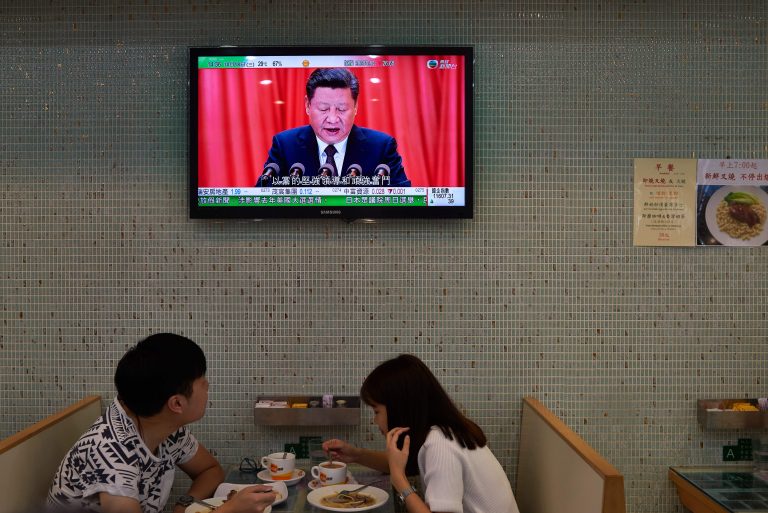Chinese leader Xi Jinping visited Hong Kong on Thursday, June 30 to mark the city’s 25th year since its handover from British rule on July 1, 1997.
During the two-day trip, he met with more than 160 officials and attended the swearing in of Hong Kong’s new leader John Lee, who previously oversaw the tightening of communist control over the port city.
In a speech, Xi warned against “dissent and chaos,” and reiterated the need for “patriots” to continue running the city.
“Having gone through ups and downs, people have learned the hard way that Hong Kong cannot be destabilized and cannot afford to seek chaos,” Xi said, obliquely referencing the millions-strong protests for democratic reform that swept Hong Kong in 2019.
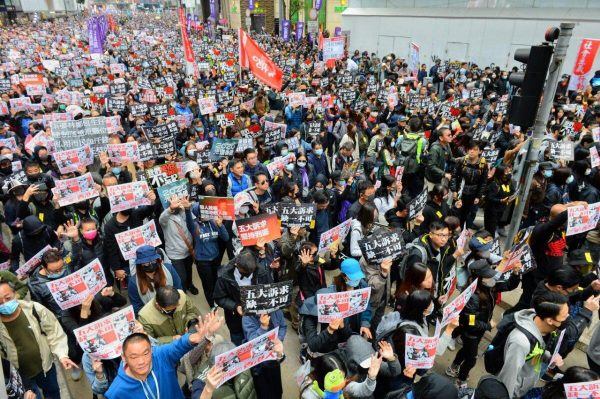
He also stressed the importance of maintaining Hong Kong’s “unique status and strengths,” including its symbol as an international financial, shipping and commercial aviation hub.
Success
You are now signed up for our newsletter
Success
Check your email to complete sign up
Xi, who was accompanied with his wife Peng Liyuan, arrived via high-speed rail from Shenzhen, the city in mainland China right next to Hong Kong — a departure from the habit of previous Chinese leaders to visit the city by plane. The Chinese leader and first lady returned to Shenzhen for the night before resuming their tour in Hong Kong the next day.
The visit was prefaced by a 12,000-word article run on June 29 by state mouthpiece People’s Daily praising Xi for safeguarding “Hong Kong’s long-term prosperity and stability” and defending the regime’s actions during the 2019 protest as “strong leadership” in the face of “ordinance revision turbulence.”
The phrase is a reference to the controversial extradition bill that sparked the demonstrations that year.
MORE ON HONG KONG:
- Incoming Hong Kong Leader John Lee Strengthens Xi’s Authority Over City
- Joseph Zen, One of Asia’s Most Senior Catholics, Arrested in Hong Kong on National Security Charges
- Despite Ban, Hongkongers Gather to Mourn Tiananmen Massacre
- Hong Kong, Once a Bastion for Free Press, Now Ranks Dismally in Annual Press Freedoms Report
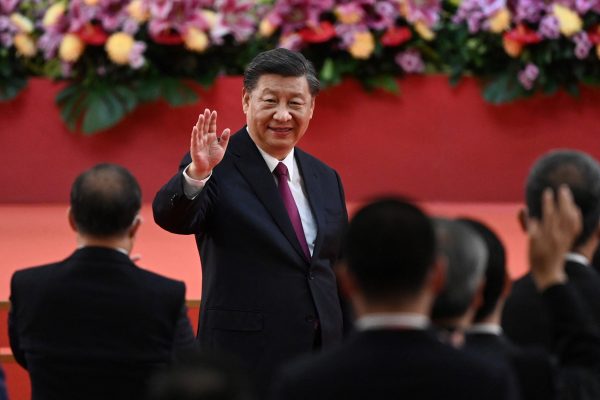
‘National security’
On July 1, Xi presided over the inauguration of John Lee Ka-chiu, Hong Kong’s former security chief and career policeman. Lee, 64, was the sole candidate at this year’s 1,461-member Election Committee where he received 99 percent of the votes from the highly vetted body of pro-Beijing electors.
Lee, who held the position of security secretary, and before that, Hong Kong’s police chief, oversaw the force’s often violent actions against the city’s demonstrations and protests in 2019 and 2020.
He also oversaw the implementation of the National Security Law (NSL) which went into effect on June 30, 2020, at the behest of the mainland Chinese government. The NSL bans many forms of political dissent and expression as threats to “national security,” and allows for a maximum sentence of life imprisonment.
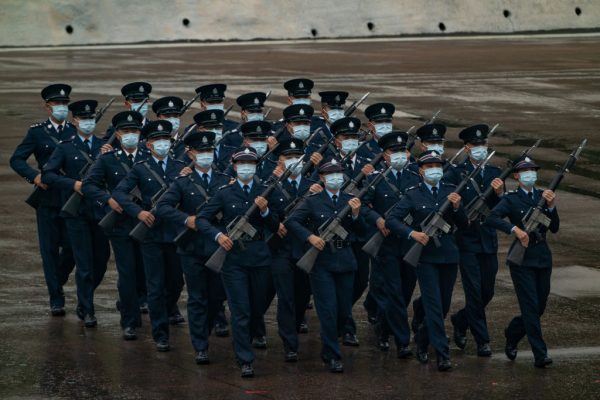
The NSL, as well as the many actions taken by the Chinese Communist Party (CCP) to undermine Hong Kong’s freedoms post-1997, are regarded as blatant violations of the 1984 Sino-British Joint Declaration — whereby the mainland Chinese government promised to guarantee Hong Kong’s civil liberties for at least 50 years under the “one country, two systems” framework.
READ MORE:
- Apple Daily Raided by Hong Kong Police; Several Arrested Under ‘National Security Law’
- Chinese State-linked Newspaper Brands Hong Kong Journalist Association as ‘Anti-China,’ Calls for Its Disbandment
- Hong Kong Hospitals Placing Body Bags Under Patients’ Beds as COVID-19 Surges Out of Control
Xi’s visit also comes at a time when Hong Kong has been plagued by an unrelenting wave of COVID-19 — with the city experiencing the deadliest outbreak of the virus to date.
In mid-March, authorities revealed that the death rate in Hong Kong had tripled due to an “untraceable outbreak of the virus,” placing the city’s death count as the highest of any developed area in the world. On March 9, Hong Kong confirmed 25,991 positive infections in a single day, along with an additional 32,766 suspected positive cases.
The situation was so dire that physicians and medical staff working at Hong Kong’s overflowing hospitals said patients were dying at such a rapid rate that their bodies were being sealed into plastic bags and then quickly cremated in order to free up space at the morgue for more arrivals.
The People’s Daily propaganda screed turned this on its head, however, praising Xi’s “remarkable achievements” of epidemic prevention and control, as well as the “gradual recovery” of the economy despite the severe shocks Hong Kong has been subjected to in recent years.
Consolidating power
Xi’s entourage included a number of senior Chinese officials, including Hong Kong and Macau Affairs Office director Xia Baolong, who assumed the role in February 2020.
In addition to marking the expansion of CCP power in the city, Xi’s visit also reflects his personal successes in wresting influence over Hong Kong from his political rivals — chiefly the faction associated with former Party boss Jiang Zemin.
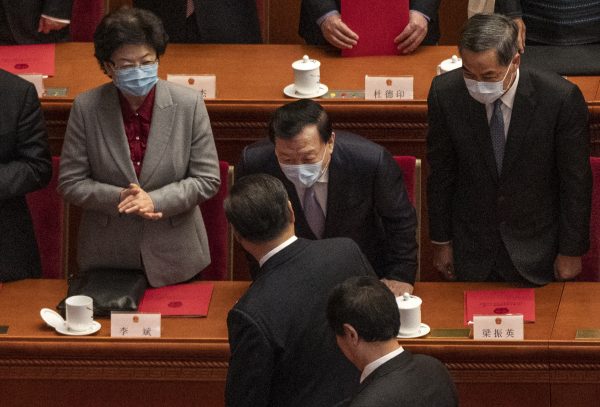
Xia Baolong had taken over from Zhang Xiaoming, a known Jiang faction associate. But Zhang retained a post as deputy director of the HKMAO until June 22 this year — when he was moved to the national committee of the Chinese People’s Political Consultative Conference (CPPCC). The move represents a major downgrade and thus sidelining of Zhang after his previous demotion.
SinoInsider, a political risk consultancy specializing in the Chinese regime, notes that it took nearly a decade for Xi to remove senior-level Jiang faction members from the agencies responsible for handling Hong Kong.
Now, “none of the senior officials in the Hong Kong and Macau apparatus appear to have close connections with the Jiang faction or power networks in the apparatus established when the Jiang faction was in complete control,” the analysts said in a June 27 newsletter.
The Jiang faction, which rose to prominence in the 2000s, is notorious for its titular head’s promotion of massive corruption during China’s economic boom. Many of its members, who are linked by involvement in Jiang’s human rights abuses, have been purged by Xi in his anti-corruption campaign.



